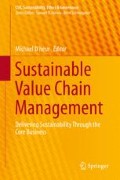Abstract
We are witnessing the transformation of developing countries into vibrant economies, which requires us to deal actively with the challenges of sustainability and resource efficiency. This article describes the Henkel Sustainability#Master®—a holistic product assessment based on life-cycle thinking that takes both value creation and product footprint into account. In this paper, the authors illustrate how this concept is successfully applied in practice.
Access this chapter
Tax calculation will be finalised at checkout
Purchases are for personal use only
Notes
- 1.
Footprint Network (2013)/biocapacity, also called biological capacity, is the capacity of an ecosystem to provide useful biological materials and absorb waste produced by humans.
- 2.
CSCP stands for the Collaborating Centre on Sustainable Consumption and Production, Wuppertal, Germany.
- 3.
Lost time accidents per million hours worked.
Bibliography
A.I.S.E. (2001). The life cycle assessment of European clothes laundering. Brussels: A.I.S.E..
A.I.S.E. (2013a). A.I.S.E. activity and sustainability report 2012–2013. Brussels: A.I.S.E..
A.I.S.E. (2013b). Low temperature washing initiative, substantiation dossier. Brussels: A.I.S.E..
Bürger, V. (2009). Identifikation, Quantifizierung und Systematisierung technischer und verhaltensbedingter Stromsparpotenziale privater Haushalte. Freiburg: Öko Institut.
CSCP. (2012). The sustainable consumption index: A product development tool. Wuppertal: CSCP.
Elkington, J. (1998). Cannibals with forks – The triple bottom line of 21st century business. Hoboken: Wiley.
European Commission. (2010, March 3). Communication from the commission – Europe 2020: A strategy for smart, sustainable and inclusive growth. COM (2010) 2020 final, Brussels.
Footprint Network. (2013). http://www.footprintnetwork.org/. Accessed 04 May 2014.
Forum Waschen. (2013). Fakten zur Verwendung von Palmkernöl in Wasch-, Pflege- und Reinigungsmitteln in Deutschland (Status 28 March 2013). http://forum-waschen.de/. Accessed 4 May 2014.
Henkel. (2011). Sustainability report 2011. Düsseldorf: Henkel.
Henkel. (2013). Sustainability report 2012. Düsseldorf: Henkel.
Müller-Kirschbaum, T., & Schröder, F. R. (2012). Nachhaltiger Konsum: Ressourceneffizienz durch Innovation in Die Neue Führungskunst – Unternehmen nachhaltig führen, Symposion, Düsseldorf.
New Economic Foundation. (2012). The happy planet index: 2012 report – A global index of sustainable well-being. London: New Economic Foundation.
RSPO. (2013). Roundtable on sustainable palm oil. http://www.rspo.org. Accessed 04 May 2014.
Scheidgen, A., & Meier, F. (2013). Of powders and pouches – Detergent innovations, trends and challenges. SOFW Journal, 139(6), 2–8.
Schröder, F. R. (2012). Tenside auf Basis von Nachwachsenden Rohstoffen für Konsumentenprodukte. Euro Cosmetics, 19–23.
United Nations. (1987). Report on the world commission on environment and development, “Our Common Future” presided over by Gro Harlem Brundtland. http://www.un-documents.net/ocf-cf.htm. Accessed 11 June 2013.
UNDP. (2013). Human development report. http://hdr.undp.org/en/2013-report.
U.S. Foreign Agricultural Service. (2014). http://www.fas.usda.gov. Accessed 04 May 2014.
von Weizsäcker, E. U., Hargroves, K., & Smith, M. (2010). Der Faktor Fünf – Die Formel für nachhaltiges Wachstum. Munich: Droemer.
WWF. (2009). Sustainable oil palm development on degraded land in Kalimantan. London: World Wildlife Fund.
Author information
Authors and Affiliations
Corresponding author
Editor information
Editors and Affiliations
Rights and permissions
Copyright information
© 2015 Springer International Publishing Switzerland
About this chapter
Cite this chapter
Schröder, F.R., Holbach, D., Müller-Kirschbaum, T. (2015). Henkel: Sustainability in the Value Chain: From Philosophy to Practice. In: D'heur, M. (eds) Sustainable Value Chain Management. CSR, Sustainability, Ethics & Governance. Springer, Cham. https://doi.org/10.1007/978-3-319-12142-0_10
Download citation
DOI: https://doi.org/10.1007/978-3-319-12142-0_10
Published:
Publisher Name: Springer, Cham
Print ISBN: 978-3-319-12141-3
Online ISBN: 978-3-319-12142-0
eBook Packages: Business and EconomicsBusiness and Management (R0)

